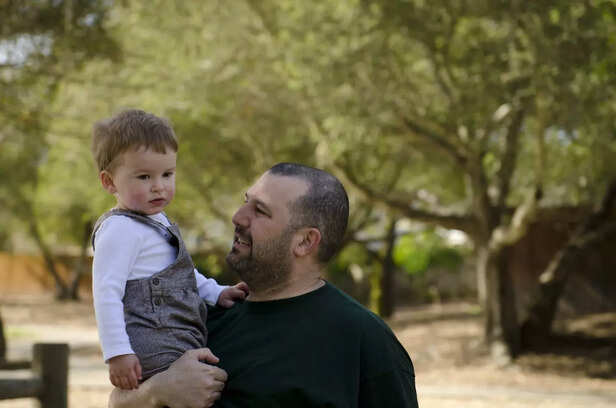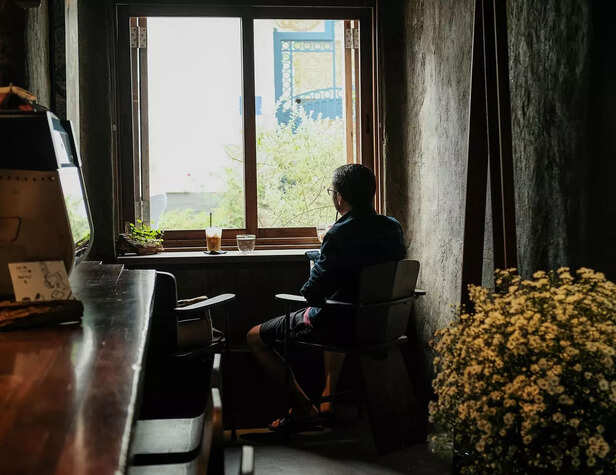The Silent Pain of Good Men – What They Wish You Knew
Noopur Bhatt | Apr 18, 2025, 07:20 IST
family man
( Image credit : Pixabay )
They carry the weight of expectations without ever being asked how they feel. Good men—fathers, brothers, husbands, sons—often walk through life silently battling insecurities, unresolved pain, and a desperate longing to be understood. But society teaches them to suppress, not express. To appear strong, even when they’re breaking inside. This article opens a window into the silent emotional world of good men—the tears they never cry, the love they rarely speak of, and the wounds they hide behind smiles. It’s a heartfelt reminder that behind the quiet strength lies a need to be heard, held, and accepted without judgment.
He never explained to you why he cried in private, why he turned away when tears filled his eyes, or why he fell silent after a quarrel. He wanted he could, though. Many people are unaware that strong, decent guys frequently harbor emotional scars that they have never been permitted to discuss. Growing up in a society that taught them that emotions are weakness is more important than simply being strong. It's about being supposed to be "the rock" while bearing generations of unsaid suffering. But when no one is looking, that rock also softly crumbles.

Boys are taught from an early age to "toughen up," "be a man," and "don't cry." These words may seem innocuous, but they end up being shackles. They encourage men to keep their emotions in check, avoid vulnerability, and repress pain. What begins as an attempt to "raise strong men" turns into a struggle with their inner selves that lasts a lifetime.

Silent concerns about their achievement, self-worth, appearance, and capacity to contribute are common among men. However, displaying these feelings is frequently interpreted as weakness. They so put on a front of strength by acting unconcerned, laughing off suffering, or retreating when overpowered. Oftentimes, what seems peaceful on the outside conceals storms inside. This silence is repression, not strength. And it's time to establish an environment where guys feel comfortable being vulnerable, honest, and unvarnished.

Men's anger is frequently simply agony disguised as a repressed cry from years of being admonished not to grieve or talk. It's a profound dissatisfaction at not being able to show vulnerability, not apathy. Many decent men fail relationships because they were never taught how to communicate their hurt, not because they don't care. Their silence is a lifetime of suppressing their emotions, not a sign of indifference.

Do you think guys are becoming more reserved? Rather than detachment, it is frequently a mute cry. They withdraw because they don't know how to communicate what's bothering them, not because they don't care. This stillness is a coping mechanism. They worry about being viewed as weak, condemned, or burdened. Isolation turns into their make-believe solace, concealing intense inner suffering behind a composed façade. It's unsaid suffering, not tranquillity.

Connection is what men deeply crave. They want to open up, to be seen and heard. But for that to happen, they need to feel safe—truly safe. A space where they're not told to "man up," where their emotions aren’t mocked or dismissed, and where someone genuinely listens without judgment. When men find that kind of emotional security, healing begins. They start shedding years of silence, and slowly, they learn it's okay to feel, to speak, and to be vulnerable.

It's acceptable if a man isn't able to communicate his feelings by the age of fifteen. He can still develop at the ages of 35 or 55. Age is not a barrier to emotional awareness, and healing is not a linear process. It's never too late to embrace vulnerability and break old habits. In addition to helping men of all ages, we also create a more compassionate world for future generations when we support them in developing emotional literacy. Growth starts as soon as we permit it.

Remind the man you care about—your father, brother, spouse, or friend—that it's acceptable to have strong emotions. Let him talk without interjecting. Pay attention without making any corrections. Encourage without exerting pressure. Give a hug without anticipating a response. Occasionally, your silent acceptance turns into the first secure environment he has ever experienced. Your generosity may be the light that enables him to open up, recover, and at last feel seen, without fear, without condemnation, just love—in a society that has taught him to conceal his suffering.

You are not weak, dear men who’ve ever swallowed their tears in silence. You are not alone if you’ve ever broken down behind closed doors. Strength isn’t in hiding pain—it’s in having the courage to feel. Healing begins the moment you accept that your emotions matter, that your heart deserves space too. The world may have taught you to toughen up, but true power lies in vulnerability. You are seen. You are valued. And it’s okay to be human.
“You don’t have to be unbreakable to be worthy. Your softness is strength. Your emotions are valid. And your story deserves to be heard.”
Let this be the space where silence ends. Where we raise men who feel deeply, love fiercely, and live fully—not behind masks, but in their whole truth.
Explore the latest trends and tips in Health & Fitness, Travel, Life Hacks, Fashion & Beauty, and Relationships at Times Life!
1. Why Men Stay Silent: It Starts Early

young boy
( Image credit : Pixabay )
Boys are taught from an early age to "toughen up," "be a man," and "don't cry." These words may seem innocuous, but they end up being shackles. They encourage men to keep their emotions in check, avoid vulnerability, and repress pain. What begins as an attempt to "raise strong men" turns into a struggle with their inner selves that lasts a lifetime.
2. The Hidden Face of Insecurity in Men

man
( Image credit : Pexels )
Silent concerns about their achievement, self-worth, appearance, and capacity to contribute are common among men. However, displaying these feelings is frequently interpreted as weakness. They so put on a front of strength by acting unconcerned, laughing off suffering, or retreating when overpowered. Oftentimes, what seems peaceful on the outside conceals storms inside. This silence is repression, not strength. And it's time to establish an environment where guys feel comfortable being vulnerable, honest, and unvarnished.
3. Anger Isn’t Always Anger—It’s Unspoken Pain

Man Sitting Alone
( Image credit : Pexels )
Men's anger is frequently simply agony disguised as a repressed cry from years of being admonished not to grieve or talk. It's a profound dissatisfaction at not being able to show vulnerability, not apathy. Many decent men fail relationships because they were never taught how to communicate their hurt, not because they don't care. Their silence is a lifetime of suppressing their emotions, not a sign of indifference.
4. Isolation: The Silent Cry for Help

man walking alone
( Image credit : Pexels )
Do you think guys are becoming more reserved? Rather than detachment, it is frequently a mute cry. They withdraw because they don't know how to communicate what's bothering them, not because they don't care. This stillness is a coping mechanism. They worry about being viewed as weak, condemned, or burdened. Isolation turns into their make-believe solace, concealing intense inner suffering behind a composed façade. It's unsaid suffering, not tranquillity.
5. The Need for Safe, Judgment-Free Spaces

Two Friends
( Image credit : Pexels )
Connection is what men deeply crave. They want to open up, to be seen and heard. But for that to happen, they need to feel safe—truly safe. A space where they're not told to "man up," where their emotions aren’t mocked or dismissed, and where someone genuinely listens without judgment. When men find that kind of emotional security, healing begins. They start shedding years of silence, and slowly, they learn it's okay to feel, to speak, and to be vulnerable.
6. Relearning Expression: It’s Never Too Late

father
( Image credit : Pexels )
It's acceptable if a man isn't able to communicate his feelings by the age of fifteen. He can still develop at the ages of 35 or 55. Age is not a barrier to emotional awareness, and healing is not a linear process. It's never too late to embrace vulnerability and break old habits. In addition to helping men of all ages, we also create a more compassionate world for future generations when we support them in developing emotional literacy. Growth starts as soon as we permit it.
7. What You Can Do: Be the Safe Space

woman and man
( Image credit : Pexels )
Remind the man you care about—your father, brother, spouse, or friend—that it's acceptable to have strong emotions. Let him talk without interjecting. Pay attention without making any corrections. Encourage without exerting pressure. Give a hug without anticipating a response. Occasionally, your silent acceptance turns into the first secure environment he has ever experienced. Your generosity may be the light that enables him to open up, recover, and at last feel seen, without fear, without condemnation, just love—in a society that has taught him to conceal his suffering.
8. A Note to the Silent Men

person
( Image credit : Pixabay )
You are not weak, dear men who’ve ever swallowed their tears in silence. You are not alone if you’ve ever broken down behind closed doors. Strength isn’t in hiding pain—it’s in having the courage to feel. Healing begins the moment you accept that your emotions matter, that your heart deserves space too. The world may have taught you to toughen up, but true power lies in vulnerability. You are seen. You are valued. And it’s okay to be human.
“You don’t have to be unbreakable to be worthy. Your softness is strength. Your emotions are valid. And your story deserves to be heard.”
Let this be the space where silence ends. Where we raise men who feel deeply, love fiercely, and live fully—not behind masks, but in their whole truth.
Explore the latest trends and tips in Health & Fitness, Travel, Life Hacks, Fashion & Beauty, and Relationships at Times Life!
